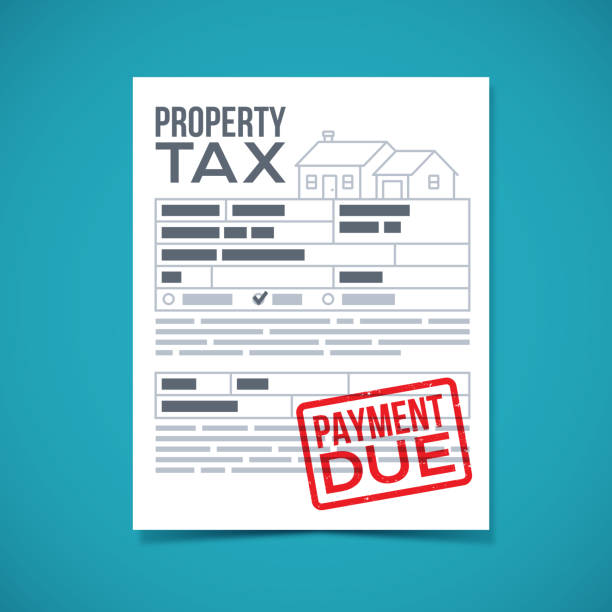
Property taxes are a fundamental aspect of property ownership, ensuring the maintenance and improvement of communities. In New York, failing to pay property taxes can lead to serious repercussions for landowners. If your property taxes become delinquent in New York, the risk of losing your home to a tax foreclosure becomes a looming possibility.
The state of New York has strict protocols in place for handling delinquent property taxes. After being awarded a foreclosure judgment in court, the city reserves the authority to convey the tax delinquent property to a qualified third party. This process underscores the importance of addressing outstanding property tax obligations promptly to avoid the severe consequences that may follow.
For those grappling with overdue property taxes, the accumulation of interest and late fines adds an additional layer of financial burden and stress. Homeowners must be vigilant in addressing their property tax responsibilities to prevent the escalation of fees and penalties that can further complicate their financial situation.
It is crucial for property owners, especially those who have inherited land in New York, to understand the implications of not paying property taxes and seek viable solutions to protect their property assets. Stay informed and proactive in managing property tax obligations to safeguard your ownership rights and financial well-being in New York.
Understanding Property Taxes in New York
Owning property in New York comes with the responsibility of paying property taxes. Understanding how property taxes are assessed and when they need to be paid is crucial to avoid any penalties. Let’s delve into the assessment process and payment schedule specifics in New York.

Assessment Process
In New York, property taxes are determined through an assessment process overseen by local assessors. These assessors evaluate the value of real estate within a community to establish tax amounts. Factors that influence property tax assessments include the property’s market value, improvements made to the property, and the property’s classification.
Importance of Accurate Assessments Accurate property assessments are essential as they directly impact the amount of property taxes a landowner must pay. Ensuring a fair and precise assessment is crucial for maintaining tax equity among property owners in the community. Property owners can review their assessments and appeal if they believe there are errors to avoid overpaying on taxes.
For more information on property assessments in New York, you can refer to resources provided by Tax.NY.gov – Assessments and DOF – Property Assessments.
Payment Schedule
Property tax payments in New York follow a specific schedule to facilitate timely payments and avoid penalties for late payments. Typically, property tax bills are issued annually, and payments are divided into installments over the year.
Key Points of the Payment Schedule:
- Taxable Status Date: March 1 in most communities
- Tentative Roll Date: May 1 in most areas
- Property Tax Due Dates: July 1, October 1, January 1, and April 1
It is crucial for landowners to adhere to these deadlines to prevent incurring late payment penalties. Property tax bills are usually sent out semi-annually to provide property owners with clear payment due dates.
For a detailed overview of the property tax payment schedule in New York, visit Tax.NY.gov – Property Tax Calendar and NYC.gov – Property Tax Bills and Payments.
Consequences of Not Paying Property Taxes

Failing to pay property taxes in New York can lead to severe consequences impacting landowners in various ways. Understanding the repercussions of neglecting property tax payments is crucial for property owners to avoid potential legal actions and financial hardships that may follow.
Tax Foreclosure Process
When property taxes become delinquent in New York, the local government can initiate a tax foreclosure process. This process can lead to the loss of the property through auction if the taxes remain unpaid. Tax foreclosure proceedings typically start after a certain period of delinquency, and the property may be sold to recover the overdue taxes.
The Real Property Tax Law in New York outlines the procedures involved in tax foreclosure, emphasizing the importance of addressing delinquent taxes promptly to prevent the risk of losing ownership rights.
For more detailed information on the tax foreclosure process in New York, you can refer to resources like Nolo – What Happens If I Don’t Pay Property Taxes in New York? and NY-Bankruptcy – Tax Lien Foreclosure in New York.
Interest and Penalties
In addition to the risk of losing the property through foreclosure, property owners face the burden of accumulating interest, fines, and penalties on overdue property taxes in New York. The longer property taxes remain unpaid, the more interest and penalties accrue, adding to the overall amount owed.
These additional charges can significantly impact landowners, leading to increased financial burdens and potential difficulties in settling the outstanding tax obligations.
Understanding the implications of interest and penalties on overdue property taxes is essential for property owners to take proactive measures to address delinquencies promptly. To learn more about the specific interest rates and penalty charges related to late property tax payments in New York, you can explore resources such as Tax.NY.gov – Interest Rates on Late Payment of Property Taxes and New Rochelle NY – Interest & Penalties.
By being aware of the consequences of not paying property taxes, landowners can make informed decisions and manage their tax obligations effectively to avoid potential legal repercussions and financial hardships.
Options for Resolving Property Tax Issues
Resolving property tax issues in New York can seem daunting, but there are several options available to assist landowners in managing and addressing delinquent property taxes. Whether you’re looking for payment plans or considering selling property with back taxes, understanding the available resources can help you navigate this complex situation effectively.
Payment Plans and Assistance Programs
If you’re struggling to pay off delinquent property taxes in New York, various payment plans and assistance programs can provide relief. The Property Tax Relief Credit offered by Tax.NY.gov directly reduces the property tax burden for qualifying homeowners. Additionally, the Property Tax and Interest Deferral (PT AID) Program, available through NYC.gov, allows eligible individuals to defer property tax payments or pay a reduced percentage.
Moreover, the 2022 homeowner tax rebate credit (HTRC) administered by Tax.NY.gov provides direct property tax relief to eligible homeowners. Understanding and utilizing programs like the School Tax Relief (STAR) program and the Senior Citizen Homeowners’ Exemption can further ease the property tax burden in New York.
Selling Property with Back Taxes
For landowners considering selling inherited property with back taxes in New York, it’s essential to understand the process to navigate effectively. In a tax lien sale scenario, as outlined by NYC.gov, delinquent liens are sold to authorized buyers without transferring property titles. This process allows for the collection of unpaid taxes without immediate property transfer.
When selling a house with a tax lien in New York, seeking guidance from professionals, as mentioned by LeaveTheKey.com, can help landowners secure the best cash offers for their properties. Understanding tax lien sales, as explained by NY-Bankruptcy.com, and the implications of tax warrants, highlighted by Tax.NY.gov, is crucial for making informed decisions when selling property with back taxes in New York.
Seeking Professional Advice
When dealing with property tax matters in New York, seeking professional advice from real estate professionals and legal experts is crucial. These experts have the knowledge and experience to provide personalized guidance tailored to your specific situation. Here are some key points to consider when seeking professional advice:

Importance of Consulting with Real Estate Professionals
Consulting with real estate professionals can offer valuable insights into property tax laws and regulations in New York. These experts can help you navigate the complexities of property taxation, exemptions, and assessment processes. By working with real estate professionals, you can develop a comprehensive understanding of your property tax obligations and explore potential strategies to address them effectively.
Guidance from Legal Experts
Legal experts specializing in property tax matters can provide essential advice on legal implications, potential risks, and available options regarding unpaid property taxes in New York. These professionals can offer legal strategies to protect your interests and guide you through the process of resolving property tax issues in a legally compliant manner. Seeking legal advice ensures that you are well-informed about your rights and responsibilities as a property owner in New York.
Benefits of Expert Assistance
Working with real estate professionals and legal experts not only helps you navigate the complexities of property tax matters but also provides peace of mind. These professionals can offer clarity on complex legal jargon, negotiate on your behalf with tax authorities, and devise personalized solutions to address your property tax concerns effectively. By leveraging their expertise, you can make informed decisions and safeguard your financial interests when dealing with property tax issues in New York.
Remember, consulting with knowledgeable professionals in the real estate and legal fields is essential for gaining a deeper understanding of property tax implications and exploring viable solutions. Their guidance can empower you to make informed decisions that align with your goals and protect your assets effectively.
For more detailed advice and personalized support, reach out to expert resources like Property Tax Advisors and Real Estate Investors Tax Consultants, who specialize in providing tailored solutions for property tax challenges.
In conclusion, failing to pay property taxes in New York can have serious repercussions, potentially leading to the loss of your property through tax foreclosure. It is crucial for out-of-state landowners, especially those who have inherited land in New York, to address their tax obligations promptly to avoid such dire consequences.
By staying informed about the implications of delinquent property taxes and seeking guidance on resolving tax issues efficiently, landowners can protect their interests and ensure a smoother process when selling inherited land with back taxes. Taking proactive steps to manage property tax responsibilities can help prevent legal complications and financial burdens down the line.
For those navigating the complexities of selling inherited land remotely, seeking professional assistance and exploring reputable solutions will be key in finding a satisfactory resolution to their situation.

